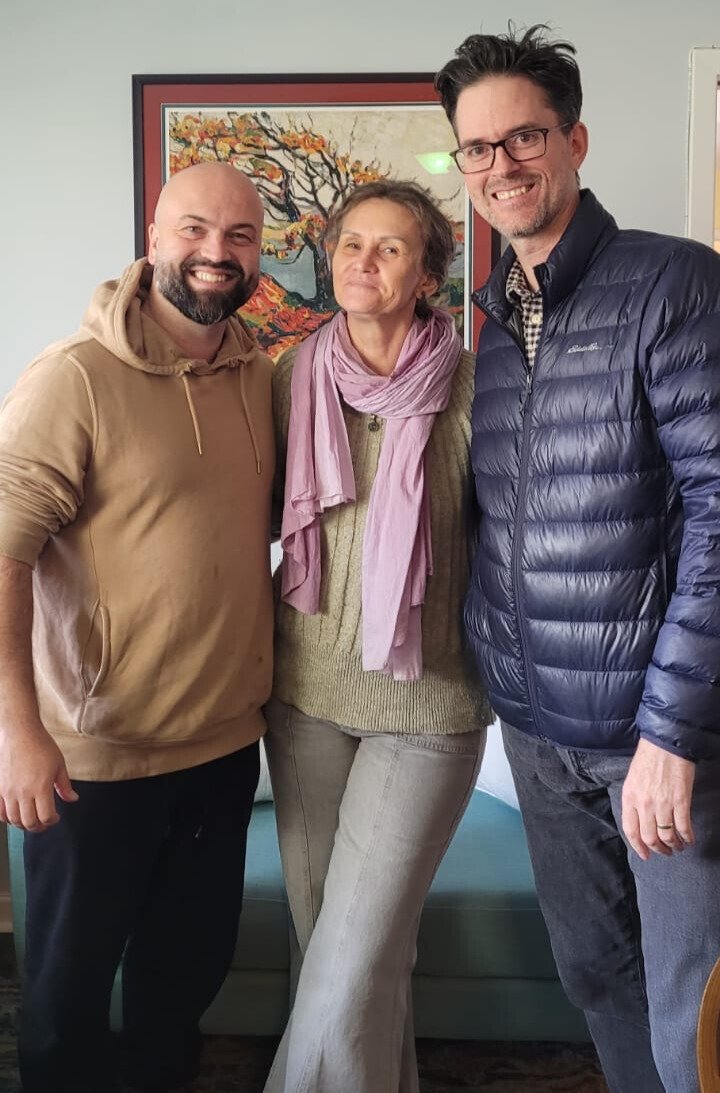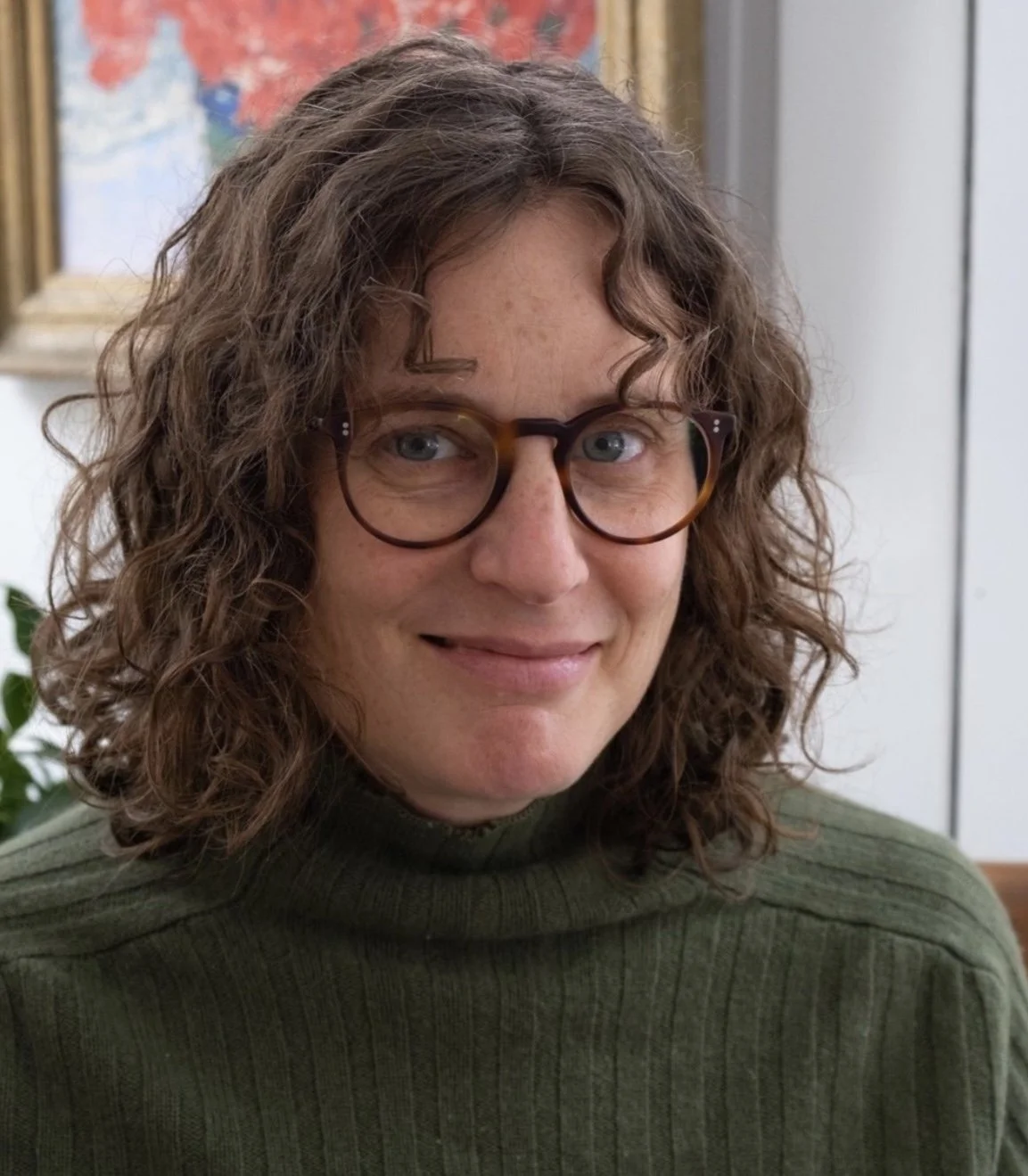A Window Into Kyiv
By Faith DiVecchio
During the first two weeks of the North American Seminary this year, we had the privilege of a visit by Rev. Tatiana Nechytailo from Kyiv, the capital of Ukraine. Rev. Nechytailo has been celebrating for two war torn years, and she shared with the seminary students some of the experiences of the community there.
In the photo:
Rev. Tatiana Nechytailo with Rev. Jonah Evans (left) and Rev. Patrick Kennedy (right) during her visit to the Seminary of the Christian Community in Toronto, CA
Ukraine, we learned through her, is a rich farmland with a long history of freedom protected by the Cossacks, warriors of the steppes. Its position in Central Europe, bordering the Black Sea, makes it a desirable location for transporting products into Europe and into the South. In recent history the Ukrainian language was forcibly suppressed by the Soviet Union, and Ukrainian people began to speak more Russian. This, she explained to us, has given a mistaken impression to the world that the Ukrainian people are an extension of Russian people, or, in the language of Russia, Ukraine is a brother of Russia. The Ukrainian people find it somewhat painful to experience the loss of their own folk and national identity in the eyes of the world through this misimpression given by the language they speak.
The community in Kyiv is overall a young community, working people, families with children, etc. They first began gathering as an affiliate in the living room of a small apartment. The neighbor’s dog would howl in accompaniment when they sang, and the smoke alarms in the building presented frequent challenges to celebrating with candles.
When Rev. Nechytailo was sent to Kyiv and began to celebrate more frequently, the congregation was soon bursting at the seams in the tiny space. They needed to move, but had no money. The first response to their request to the larger movement was to keep growing and as more people came, the money would be present. But the impulse was strong in the group and in the priest to find a new space, so they began to look. It wasn’t long before they found a beautiful space, but it cost about EUR 500,000 euros. They had 5,000 euros to put down, and if they didn’t come up with the full sale price in a week, they would lose the 5,000, which was all they had! For reasons they could not explain, they felt compelled to do it anyway.
The day after they put down the earnest money, Rev. Nechytailo went on a previously scheduled trip to Stuttgart to meet Ukrainian Lenker Stephan Meyer, who was then also a member of the Circle of Seven, the leadership circle of the worldwide movement for religious renewal. She shared the story and plea from Ukraine, and he in turn took it to a financial meeting of the leadership circle the next day. As it happened, the entire circle was moved to help the congregation in Kyiv buy the building, and that is what subsequently happened.
The transaction took about 3 months, and The Consecration of the Human Being began to be celebrated in the new space in October 2019. In March of 2020, Covid hit, and much of the city closed down. The new church became a center for people who still felt able to gather. The Waldorf classes used the church space on an alternating schedule to be able to meet each week in person. Celebration of the sacrament continued uninterrupted.
The building of the Chistian Community in Kiyv, Ukraine
In the entrance standing Rev. Tatiana Nechytailo
The pandemic had not yet ended when the war broke out. The people of Kyiv woke up on February 24, 2022, to explosions in the city. The city was attacked by missiles. The first month of the war, Kyiv was under constant shelling, with an explosion heard every 5-10 minutes. Scores of people left Kyiv, the city was devastated. In small towns near Kyiv that were occupied by the Russians, countless civilians were killed and houses destroyed. Many families from the Waldorf community suffered, and many parents and graduates of Waldorf schools volunteered to go to the front to defend the country. Some were killed, some were left disabled, having lost arms, legs, or eyes. About a year ago, on Christmas Eve, a rocket fell right next to the Waldorf school. The explosion destroyed the facade of the school building and smashed all the windows. Fortunately, the rocket attack took place at night and the children were not injured. The rocket attacks have been going on since the beginning of the war, which started almost 3 years ago now. Life in the city continues, but air raids and curfews are part of daily life, as are the constant blackouts resulting from the destruction of the country's power supply system. Many young people—the gold of Ukraine—are dying at the front. The first wave of soldiers went to fight for their country voluntarily, a great sacrifice made to defend Ukraine’s freedom. Now, in the third year of the war, people are exhausted. They live with constant stress, poor sleep, and nonstop worry about the lives of their loved ones. The frontline needs to rotate in new soldiers, which leads to the conscription of young people. A painful lose-lose situation results: Without rotation, the front collapses, but without its youth, the country loses its future. Every single person faces a great moral dilemma.
The church still stands. It has increasingly become a meeting place not only for The Christian Community and Anthroposophical and Waldorf communities, but also for many others in the city. Like a heart organ of the city, the church receives the pulse of supplies and distributes to those in need. It knows where help is needed, and nothing prevents the celebration of the sacraments. The sustaining power of Christ is a concrete and immediate reality in every moment, any one of which could bring death. The church is a center that stands, as Christ stands with us, bearing the agony and suffering of human experience.
Rev. Nechytailo celebrated in Ukrainian, the beautiful sounds of the language moving through the sanctuary. She also left the seminary students with some advice and a wish: Come to know the angel of the congregation so that you can receive the promptings of the spirit world toward what must be done. Christ will work through the church in powerful ways that we could never accomplish alone.
Our Author: Faith DiVecchio
Walking With Christ student
from Hillsdale, NY.
Faith is a trained Waldorf teacher who has a diverse entrepreneurial background. She has also been a professional fundraiser and has led courses about Mary Magdalene.
She has homeschooled her three children.




